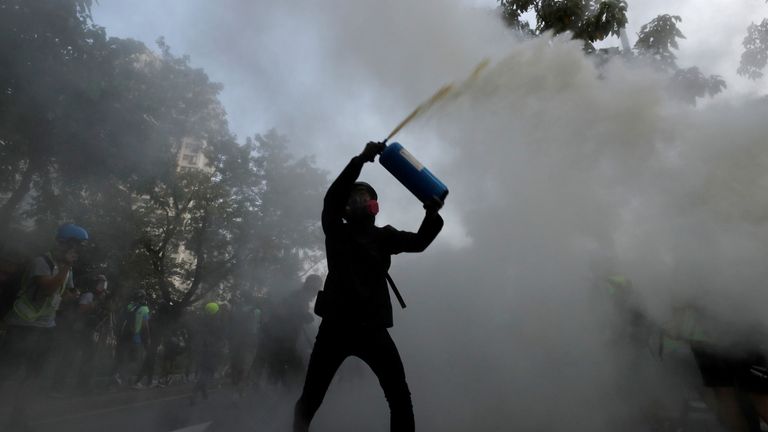China becomes a 'global disinformation superpower' says report into online proaganda
More than 70 countries are now sharing misinformation online and politicians are using propaganda tools to garner support.
Thursday 26 September 2019 03:37, UK
China has now become a major player in using propaganda on social media to try to influence opinions and world events, according to the Oxford Internet Institute.
It says organised social media manipulation has more than doubled since 2017 with 70 countries now sharing misinformation online.
And it claims that 45 democracies, politicians and political parties used computational propaganda tools to gather fake followers or spreading manipulated media to garner voter support.
In 26 authoritarian states, government entities used computational propaganda as a way to control information, suppress public opinion and press freedom, discredit criticism, and drown out political dissent.
The institute report says the catalyst for China's increase in global social media manipulation campaigns was the protests in Hong Kong, where it has tried to brand democracy advocates as violent radicals with no popular appeal.
Previously it had mainly concentrated on domestic propaganda.
In August, Facebook said it had removed seven pages, three groups and five Facebook accounts involved in coordinated inauthentic behaviour as part of a small network that originated in China and focused on Hong Kong.
"China has become, what we're calling, a global disinformation superpower," Professor Philip Howard, director of the Oxford Internet Institute, said.
"It's flexed its muscles, it's clearly operating on multiple platforms, it's targeting voters in the west for their opinion.
"The Russians have been the most creative and persistent at using social media to manipulate public opinion, but they've been targeting many countries over many years.
"We thought the Chinese had the capacity but it's only recently that they've been doing as much as the Russian government has."
He added: "My biggest concern is now that we understand something of China's capacity, that China might start getting involved in election conversation within democracies.
"Since 2016 we've almost got used to the notion that the Russians will try to contribute to public conversation during elections, and now it may be the Russians and Chinese that weigh in on public conversations over social media when the UK votes, maybe early next year or during the US elections, Canada is voting in a month."
Professor Howard said extremists in the UK had learned from the techniques used by Russia, mainly across Facebook and Twitter, and were now using them for their own ends.
He said: "This is home-grown content, usually from white supremacists, from extreme right-wing, and they will produce the same kinds of stories about immigrants taking our jobs, or political Islam spreading in high schools at wildfire rates
- immigration and anti-European sentiment are common themes."
The institute said the true scale of the problem of online misinformation may be much larger than its report suggests because social media firms are not open enough, as well as young people using newer closed platforms such as Snapchat.
Samantha Bradshaw, lead author of the report said: "Although social media was once heralded as a force for freedom and democracy, it has increasingly come under scrutiny for its role in amplifying disinformation, inciting violence, and lowering trust in the media and democratic institutions."





